
Paul McCartney and Wings were a British-American rock band formed in 1971 by former Beatle Paul McCartney, his wife Linda McCartney on keyboards, session drummer Denny Seiwell, and former Moody Blues guitarist Denny Laine. Wings were noted for frequent personnel changes along with their commercial successes, going through three lead guitarists and four drummers. However, the core trio of the McCartneys and Laine remained intact throughout the group's existence.
"The Battle of Evermore" is a folk duet sung by Robert Plant and Sandy Denny, featured on Led Zeppelin's untitled 1971 album, commonly known as Led Zeppelin IV. The song's instrumentation features acoustic guitar and mandolin playing, while the lyrics allude to J. R. R. Tolkien's fantasy novel The Lord of the Rings.

Frankie Laine was an American singer, songwriter, and actor whose career spanned nearly 75 years, from his first concerts in 1930 with a marathon dance company to his final performance of "That's My Desire" in 2005. Often billed as "America's Number One Song Stylist", his other nicknames include "Mr. Rhythm", "Old Leather Lungs", and "Mr. Steel Tonsils". His hits included "That's My Desire", "That Lucky Old Sun", "Mule Train", "Jezebel", "High Noon", "I Believe", "Hey Joe!", "The Kid's Last Fight", "Cool Water", "Rawhide", and "You Gave Me a Mountain".
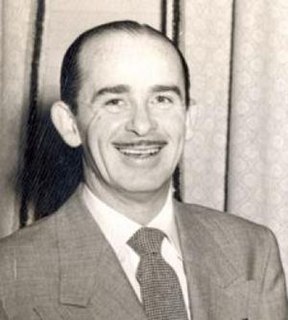
Ned Washington was an American lyricist born in Scranton, Pennsylvania.

Denny Laine is an English musician, singer, and songwriter, known as a founder of two major rock bands: the Moody Blues, with whom he played from 1964 to 1966, and Wings, with whom he played from 1971 to 1981. Laine has worked with a variety of artists and groups over a six-decade career, and continues to record and perform as a solo artist. In 2018, Laine was inducted into the Rock and Roll Hall of Fame as a member of the Moody Blues.

"Dogs" is a song by English progressive rock band Pink Floyd, released on the album Animals in 1977. This song was one of several to be considered for the band's 2001 compilation album Echoes: The Best of Pink Floyd.
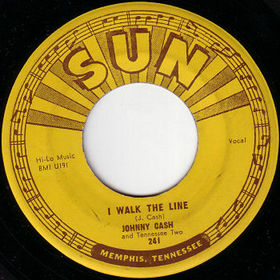
"I Walk the Line" is a song written and recorded in 1956 by Johnny Cash. After three attempts with moderate chart ratings, it became Cash's first #1 hit on the Billboard charts, eventually reaching #17 on the US pop charts.

3:10 to Yuma is a 1957 American Western film directed by Delmer Daves, starring Glenn Ford and Van Heflin. Based on a 1953 short story by Elmore Leonard, it is about a drought-impoverished rancher who takes on the risky job of escorting a notorious outlaw to justice. In 2012, it was selected for preservation in the United States National Film Registry by the Library of Congress as "culturally, historically, or aesthetically significant".
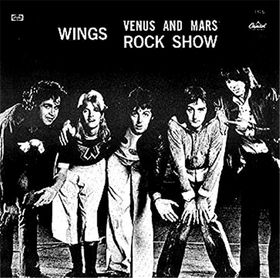
"Venus and Mars"/"Rock Show" is a medley of two songs written by Paul and Linda McCartney and originally performed by Wings that make up the first two songs of the album Venus and Mars. The single was released in the United States on 27 October 1975 and in the United Kingdom on 28 November 1975. The B-side is "Magneto and Titanium Man", another track from the album. The single version is considerably shorter than the album version of the songs; in the single "Rock Show" is cut by more than 3 minutes and "Venus and Mars" is cut by a few seconds. "Venus and Mars/Rock Show" peaked at number 12 on the Billboard Hot 100 in the US, but did not chart on the UK singles chart, the first McCartney penned single to do so. In the book The Rough Guide to the Beatles, Chris Ingham praised both songs, describing "Venus and Mars" as "atmospheric" and "Rock Show" as "barnstorming".
"Rock Island Line" is an American folk song. Ostensibly about the Chicago, Rock Island and Pacific Railroad, it appeared as a folk song as early as 1929. The first recorded performance of "Rock Island Line" was by inmates of the Arkansas Cummins State Farm prison in 1934.
Laurel and Hardy were primarily comedy film actors. However, many of their films featured songs, and some are considered as musicals in their own right. The composer Leroy Shield scored most of Laurel and Hardy sound shorts although they were often misattributed to Marvin Hatley.

"I Lie Around" is a song by Paul McCartney and Wings that was released as the B-side to the "Live and Let Die" single in 1973. The first two verses are sung by Wings guitarist Denny Laine, Paul McCartney sings the third verse.

"Bluebird" is a song written by Paul and Linda McCartney and originally performed by the British rock band Wings, released on their 1973 album Band on the Run. According to author John Blaney, it was written during a vacation in Jamaica. However, author Vincent Benitez claims the song was written as early as 1970 or 1971, noting that Paul and Linda sang the song during a live interview in New York City in 1971. In Continental Europe it was also released as the B-side of the "Mrs. Vandebilt" single.

It's Sandy Denny is a compilation album, issued in 1970. It consists of songs Sandy Denny recorded for Saga Records in 1967, and which were initially released on two separate albums: Alex Campbell and his Friends and Sandy and Johnny.
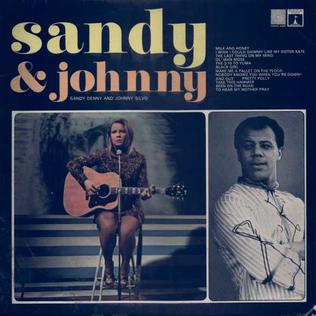
Sandy and Johnny is a split album featuring early recordings by Sandy Denny and Johnny Silvo, recorded for Saga Records in 1967. Despite being credited to both singers, the album consists of solo songs by each.

The Stone Poneys is the debut studio album by the Stone Poneys; other than an early single of "So Fine" that was produced by Mike Curb in 1965, this album marks the first official recordings by Linda Ronstadt.
"The Pig Got Up and Slowly Walked Away" is a 1933 temperance-themed song with music by F. W. Bowers and lyrics by Benjamin Hapgood Burt.
"No Words" is a song written by Paul McCartney and Denny Laine, and first released on 7 December 1973 on Band on the Run by Paul McCartney and Wings. The song was Laine's first co-writing on a Wings album and his only writing credit on Band on the Run.
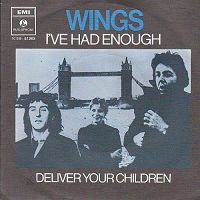
"Deliver Your Children" is a song written by Denny Laine and Paul McCartney that was first issued on Wings' 1978 album London Town. It was also released as the B-side of Wings' single "I've Had Enough". In the Netherlands, it received enough airplay to be ranked on the national charts along with its A-side, and joint single reached No. 13. On some charts within the Netherlands "Deliver Your Children" was ranked alone on the single charts, and it reached No. 9 on the Stichting Nederlandse Top 40 chart. Laine also released solo recordings of the song.
"Cuando calienta el sol" is a popular Spanish language song originally composed as "Cuando calienta el sol en masachapa". The music was written by Rafael Gaston Perez, a Nicaraguan songwriter and bandleader. SADAIC also credits the Argentine composer Carlos Albert Martinoli.













